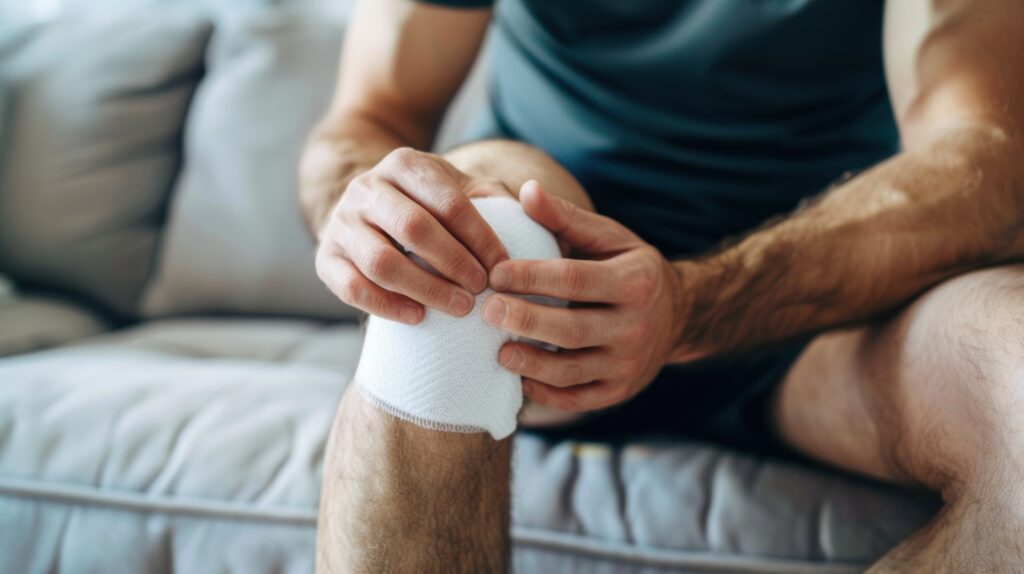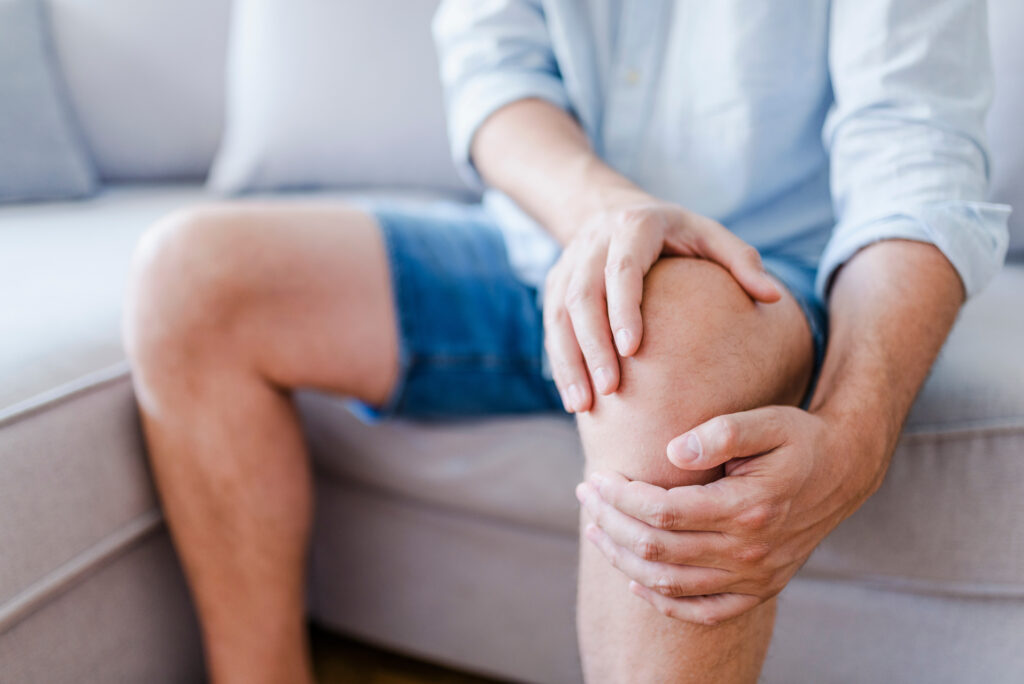Are knee pain or injuries holding you back? At Behan Orthopedics, we’re committed to providing expert care, offering both relief and hope. Dr. Behan, your dedicated Orthopedic Doctor in Bay City, Michigan, specializes in comprehensive Knee Pain Treatment and Knee Injury Treatment. We understand the challenges you face and are here to support you every step of the way.
Dr. Behan, a renowned Orthopedic Surgeon in Bay City, Michigan, brings unparalleled expertise to every case.
We tailor our Knee Pain Treatment to your specific needs, ensuring the most effective recovery.
Utilizing state-of-the-art technology and methods for knee injury treatment.
Relieve Pain: Our treatments are designed to alleviate pain, improving your quality of life.
Restore Function: Get back to doing what you love with restored knee function.
Prevent Future Injury: We focus not just on treatment but also on preventing future issues.
Dr. Behan, a renowned Orthopedic Surgeon in Bay City, Michigan, brings unparalleled expertise to every case.
We tailor our Knee Pain Treatment to your specific needs, ensuring the most effective recovery.
Utilizing state-of-the-art technology and methods for knee injury treatment.
Relieve Pain: Our treatments are designed to alleviate pain, improving your quality of life.
Restore Function: Get back to doing what you love with restored knee function.
Prevent Future Injury: We focus not just on treatment but also on preventing future issues.

Knee pain can significantly affect your daily life, making it difficult to perform even the simplest of tasks. Understanding the various causes of knee pain can help in seeking the right treatment.
Ligament Injuries: Injuries such as ACL (anterior cruciate ligament) tears are prevalent among athletes and can cause severe knee pain and instability.
Meniscus Tears: The meniscus acts as a shock absorber, and tears can occur due to sudden twists or degeneration over time.
Fractures: Breaking bones around the knee, like the patella, can cause intense pain and require immediate medical attention.
Loose Body: Sometimes an injury or degeneration can cause a piece of bone or cartilage to break off and float in the joint space, leading to pain and joint dysfunction.
Dislocated Kneecap: This occurs when the patella slips out of place, often moving to the outside of the knee, causing pain and swelling.
Osteoarthritis: The most common form of arthritis affecting the knees. It involves wear-and-tear damage to the cartilage.
Rheumatoid Arthritis: This autoimmune condition can affect any joint in the body, including the knees, causing pain, swelling, and joint damage.
Gout: This form of arthritis is characterized by uric acid crystals in the joint, leading to severe pain and inflammation.
Bursitis: Inflammation of the bursae, the small fluid-filled sacs that cushion the knee joint, can cause pain and swelling.
Tendinitis: Inflammation of the tendons around the knee, commonly due to overuse, can result in pain, particularly when climbing stairs or running.
Breaks in the bones of the elbow joint caused by trauma or falls.
Symptoms: Severe pain, swelling, bruising, and an inability to move the elbow.
Understanding these causes and risk factors is crucial in managing knee pain effectively. At Behan Orthopedics, we specialize in diagnosing and treating these underlying issues, providing you with a personalized care plan tailored to your specific needs. Trust your knee health to our expert team for comprehensive and compassionate care.
Regular Exercise: Incorporate low-impact activities such as swimming, walking, or cycling into your routine to keep your knees flexible and strong.
Strength Training: Focus on strengthening the muscles around your knees, including your quadriceps, hamstrings, and calves, to provide better joint support.
Exercise Form: Ensure you use the correct form during exercises and sports to avoid unnecessary strain on your knees. Consider working with a trainer if you are unsure about your form.
Footwear: Wear shoes that provide proper support and cushioning, particularly for activities that involve running or jumping.
Warm-Up: Take time to warm up before engaging in physical activities to prepare your muscles and joints.
Stretching: Regularly stretch your leg muscles, especially your quadriceps and hamstrings, to maintain flexibility and reduce tension on your knees.
Pain Signals: Pay attention to any knee pain or discomfort. Avoid pushing through pain, as it may indicate an underlying issue that needs attention.
Rest and Recovery: Allow time for your knee joints to rest and recover, especially after intense activities or if you experience pain.
Safe Environment: Keep your living and working spaces free of obstacles to prevent trips and falls that could cause knee injuries.
Balance Exercises: Engage in balance and stability exercises to improve your coordination and reduce the risk of falls.
Knee pain can significantly affect your daily life, making it difficult to perform even the simplest of tasks. Understanding the various causes of knee pain can help in seeking the right treatment.

Ligament Injuries: Injuries such as ACL (anterior cruciate ligament) tears are prevalent among athletes and can cause severe knee pain and instability.
Meniscus Tears: The meniscus acts as a shock absorber, and tears can occur due to sudden twists or degeneration over time.
Fractures: Breaking bones around the knee, like the patella, can cause intense pain and require immediate medical attention.
Loose Body: Sometimes an injury or degeneration can cause a piece of bone or cartilage to break off and float in the joint space, leading to pain and joint dysfunction.
Dislocated Kneecap: This occurs when the patella slips out of place, often moving to the outside of the knee, causing pain and swelling.
Osteoarthritis: The most common form of arthritis affecting the knees. It involves wear-and-tear damage to the cartilage.
Rheumatoid Arthritis: This autoimmune condition can affect any joint in the body, including the knees, causing pain, swelling, and joint damage.
Gout: This form of arthritis is characterized by uric acid crystals in the joint, leading to severe pain and inflammation.
Bursitis: Inflammation of the bursae, the small fluid-filled sacs that cushion the knee joint, can cause pain and swelling.
Tendinitis: Inflammation of the tendons around the knee, commonly due to overuse, can result in pain, particularly when climbing stairs or running.
Septic Arthritis: An infection in the knee joint can lead to swelling, pain, and fever, requiring prompt medical intervention.
Breaks in the bones of the elbow joint caused by trauma or falls.
Symptoms: Severe pain, swelling, bruising, and an inability to move the elbow.
Understanding these causes and risk factors is crucial in managing knee pain effectively. At Behan Orthopedics, we specialize in diagnosing and treating these underlying issues, providing you with a personalized care plan tailored to your specific needs. Trust your knee health to our expert team for comprehensive and compassionate care.
Weight Management: Excess weight puts additional stress on your knee joints. Maintaining a healthy weight can reduce the risk of osteoarthritis and other knee-related conditions.
Regular Exercise: Incorporate low-impact activities such as swimming, walking, or cycling into your routine to keep your knees flexible and strong.
Strength Training: Focus on strengthening the muscles around your knees, including your quadriceps, hamstrings, and calves, to provide better joint support.
Exercise Form: Ensure you use the correct form during exercises and sports to avoid unnecessary strain on your knees. Consider working with a trainer if you are unsure about your form.
Footwear: Wear shoes that provide proper support and cushioning, particularly for activities that involve running or jumping.
Warm-Up: Take time to warm up before engaging in physical activities to prepare your muscles and joints.
Stretching: Regularly stretch your leg muscles, especially your quadriceps and hamstrings, to maintain flexibility and reduce tension on your knees.
Pain Signals: Pay attention to any knee pain or discomfort. Avoid pushing through pain, as it may indicate an underlying issue that needs attention.
Rest and Recovery: Allow time for your knee joints to rest and recover, especially after intense activities or if you experience pain.
Knee Braces: If you are prone to knee injuries or have a history of knee issues, consider using knee braces or supports during high-impact activities to provide additional protection.
Safe Environment: Keep your living and working spaces free of obstacles to prevent trips and falls that could cause knee injuries.
Balance Exercises: Engage in balance and stability exercises to improve your coordination and reduce the risk of falls.

Don’t let knee pain control your life. Trust the expert care of Dr. Behan and the team at Behan Orthopedics. Start your journey to pain relief and improved mobility now.
Insurances may be subject to certain plans or authorizations.














